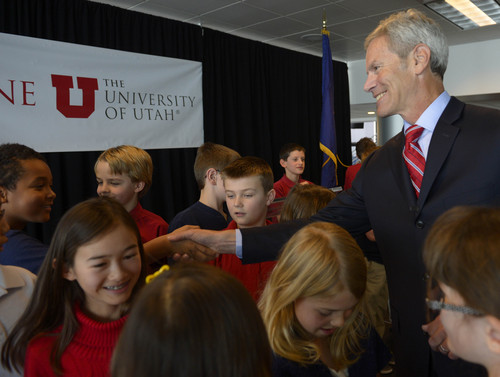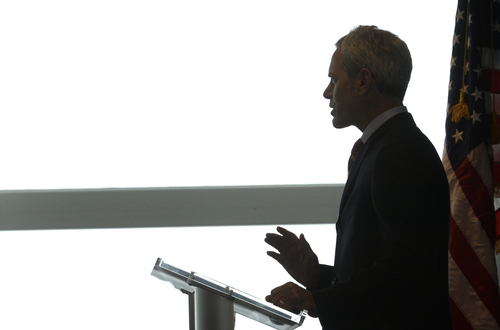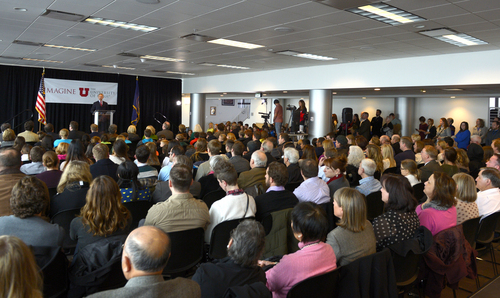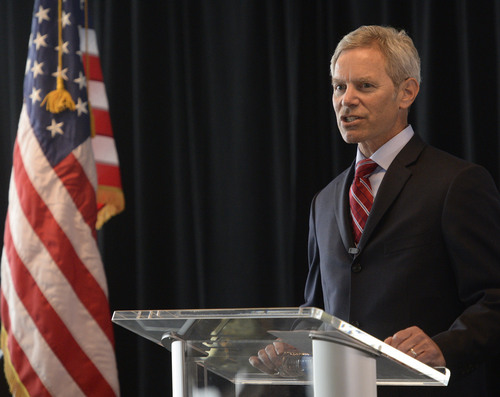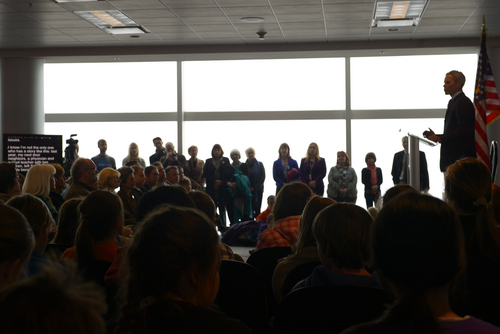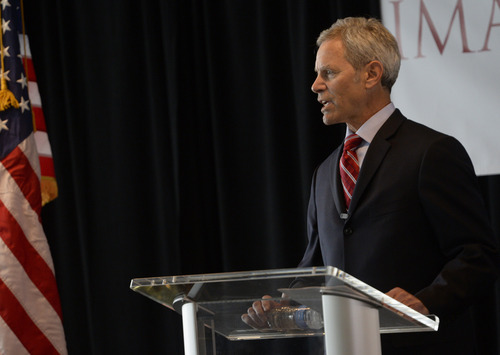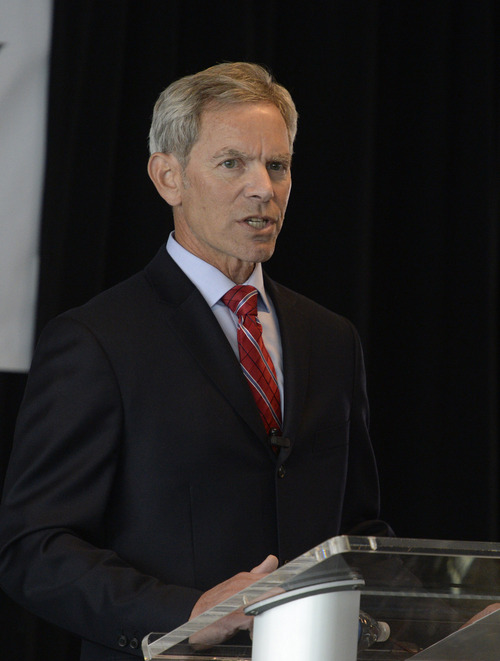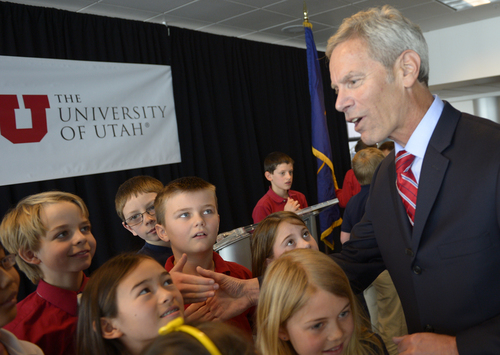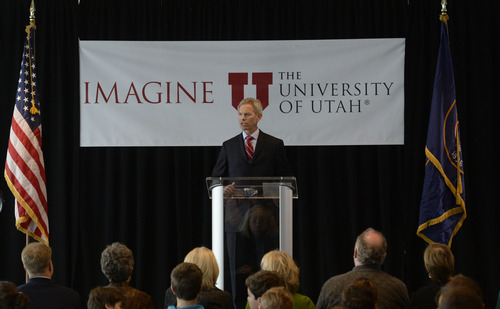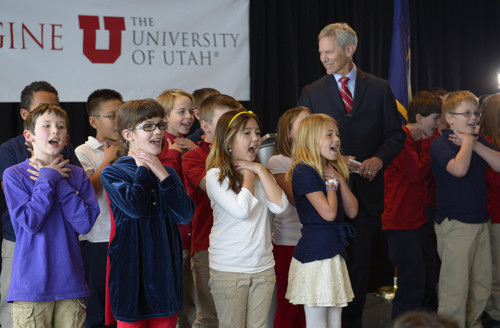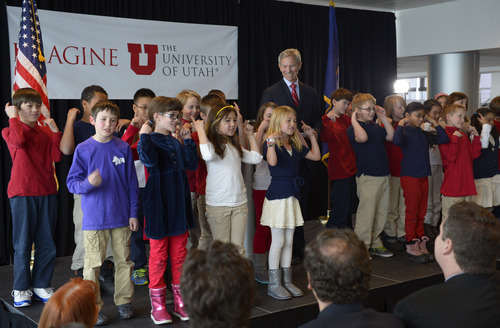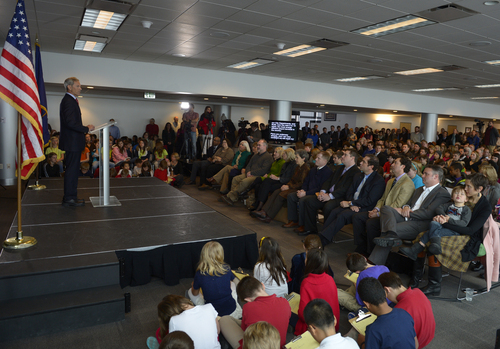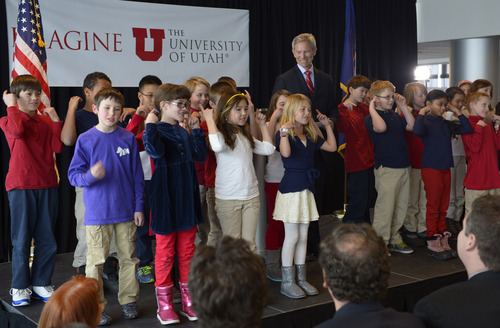This is an archived article that was published on sltrib.com in 2014, and information in the article may be outdated. It is provided only for personal research purposes and may not be reprinted.
In the annual State of the City address, Salt Lake City Mayor Ralph Becker took dead aim at air quality, outlined an aggressive policy for the capital city and urged state leaders to do more.
"Our health depends on the quality of our air more than any of us may even realize. It directly impacts our health and our economic health, not to mention our mental health," Becker said.
The mayor cited instances of families moving away to protect their children's health, businesses refusing to relocate here because of the poor air quality and top faculty and research prospects who refused jobs at the University of Utah because of air pollution.
The mayor dispensed with the usual State of the City format reciting accomplishments and goals to focus his remarks exclusively on air quality. He chose the 6th floor Varsity Room of the Rice-Eccles Stadium Tower on the U of U campus for his address and asked his audience to "look out the window and contemplate our future."
The normally soft-spoken, wonkish mayor gave an impassioned 40-minute speech to a standing-room-only crowd of about 300. He told his enthusiastic audience that state leaders should step up in five areas to fight air pollution. And then he added this: "I implore you to take serious action on air quality this year. But if you cannot, give us the authority to do it locally."
—
Proposals • Those measures are: allocate more money for public transit; make available lower-sulphur gasoline; set better air-quality standards; increase the gasoline tax; and adopt energy-efficient building codes.
Utah's future is in jeopardy, the former state legislator warned. "We need change, and much of the change we need can only come from the authority held at the state level."
Sara Baldwin of Utah Clean Energy said the address should energize residents as well as lawmakers. "His call to the state to step up or step aside is a strong call to action," she said in an interview.
Air pollution does not recognize city boundaries and is a problem throughout the Wasatch Front. Although 57 percent of air pollution in northern Utah comes from automobiles, a significant portion comes from buildings, the mayor said.
Going forward, Salt Lake City will raise the standard of municipal building construction to LEED Gold through executive order, evaluate the energy use of large commercial buildings, provide assistance to building owners for energy-efficient upgrades, develop tailpipe emissions reductions plans for all city departments and build the most energy efficient airport in the nation.
Already, Becker said Salt Lake City has converted its fleet to "clean fuels and low-emission vehicles; adopted an anti-idling ordinance; required new taxi fleets to have low-emission vehicles; doubled the city's bike lanes; created the SLC Bikeshare program; partnered with Utah Clean Cities to provide electric car-charging stations, and will provide monthly UTA transit passes to all city residents for $30 per month.
—
Getting personal • But the mayor added that air quality is not just a government responsibility.
He asked individuals and families to help reduce air pollution by forming new habits, such as combining errands for fewer automobile trips, using mass transit and bicycles whenever possible and turning off car engines while waiting for kids at school.
Roland Hall senior Anne Kim, 17, said the speech was "inspiring." And, she added, that it correctly "puts a lot of responsibility on the people who live here."
Becker closed his address by quoting Wallace Stegner: "One cannot be pessimistic about the West. This is the native home of hope. When it fully learns that cooperation is the quality that most characterizes and preserves it, then it has a chance to create a society to match its scenery."
The address was met with wide praise by those in attendance.
"It was powerful and passionate with fear and passionate with hope," said Roger Borgenicht of Utahns for Better Transportation. "It's the kind of presentation the Legislature and the citizens need to hear."
Another Roland Hall student, Olivia Pecora, also 17, said the address outlined a large number of ways to clean up the air. "It's a great proposal. And I think it's great he's putting pressure on the state government."
And state Rep. Rebecca Chavez-Houck, D-Salt Lake City, said the mayor's call for local control may resonate on Capitol Hill. "The local control argument has worked for us on other issues," she said.
Nonetheless, the Utah Legislature also has worked to undermine Salt Lake City's anti-idling law, has been reluctant to increase taxes for mass transit and, at this point, appears wary of a proposal to allow counties to raise gasoline taxes.
Becker would not predict outcomes on Capitol Hill, but he said he believes Utahns have had enough when it comes to air pollution. "Enough is enough," he said.
State of City highlights
State • Mayor Ralph Becker calls on the governor and Legislature to allocate more money for public transit; make available lower-sulphur gasoline; set better air-quality standards; increase the gasoline tax; and adopt energy-efficient building codes.
City • Salt Lake will raise the standard of municipal building construction to LEED Gold through executive order, evaluate the energy use of large commercial buildings, provide assistance to building owners for energy-efficient upgrades, develop tailpipe emissions reductions plans for all city departments and build the most energy efficient airport in the nation.
Residents • Individuals should combine errands for fewer automobile trips, use mass transit and bicycles whenever possible and turn off car engines while waiting for kids at school.


